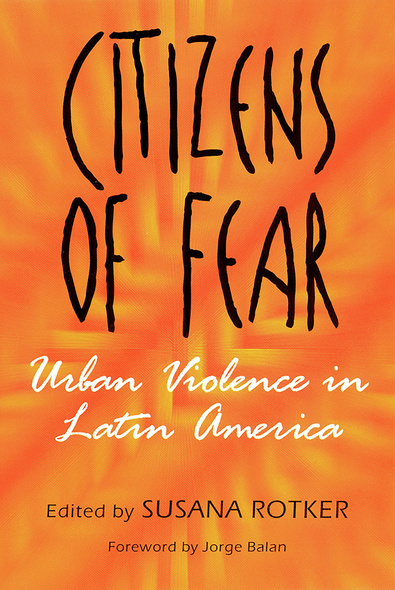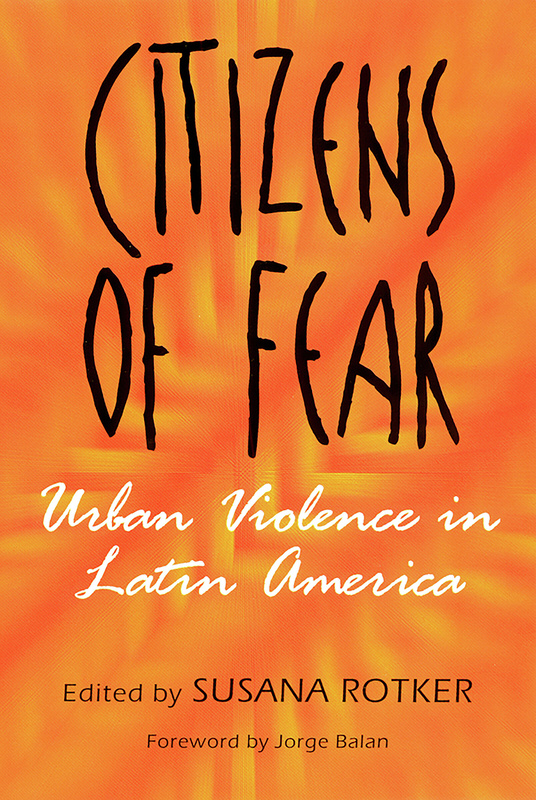Our shopping cart is currently down. To place an order, please contact our distributor, UTP Distribution, directly at utpbooks@utpress.utoronto.ca.
Citizens in Latin American cities live in constant fear, amidst some of the most dangerous conditions on earth. In that vast region, 140 thousand people die violently each year, and one out of three citizens have been directly or indirectly victimized by violence. In Venezuela, adults are on average targets of crime seventeen crimes in their lifetimes, four of which are violent. In Mexico, 97 percent of all reported crimes go unpunished. Crime, in effect, is an undeclared war. Citizens of Fear, in part, assembles survey results of social scientists who document the pervasiveness of violence. But the numbers tell only part of the story. Other contributors present moving testimonials by the victimized and by journalists covering the scene. A third group of essayists explores the implications of the resulting fear for both thought and behavior. As Susana Rotker writes, "The city has been transformed into a space of vulnerability and danger...What I am interested in narrating here is...the generalized sensation of insecurity that taints the Latin American capitals, the sensation that has changed the ways people relate to urban space, to other human beings, to the state, and to the very concept of citizenship. "
Rotker has collected papers from a colloquium on culture, citizenship, and urban violence in Latin America held in Mexico in 2000. . . . The quality of the writing and research varies, but all the contributors seem equally passionate in responding to a problem that cannot be limited to one geographic area. This kind of approach is especially useful in conveying the words and experiences of ordinary urban citizens about how fear shapes their lives. Recommended for academic collections in Latin American studies, urban studies, and international policy.
Rotker and 14 contributors examine urban violence in Mexico, Colombia, Venezuela and Brazil, since these countries share common characteristics and have been marked by the greatest recent rise in crime. . . . The book includes firsthand accounts by journalists of violence against themselves and others, perpetrated by both criminals and the authorities.
SUSAN ROTKER was a professor in the Spanish department at Rutgers University. She is the author of The Memoirs of Fray Servando Teresa de Mier and The American Chronicles of Jose Marti: Journalism and Modernity in Spanish America. She died in 2000, shortly after completing her work on this book.
Preface
Acknowledgments
Introduction
Cities Written by Violence: An Introduction
The Fears
The City: Between Fear and the Media
The Facts
Urban Violence in Latin America and the Caribbean: Dimensions, Explanations, Actions
Colombia: Toward an Institutional Collapse?
Terror and Violence in Mexican Political Culture at the End of the Twentieth Century
Democracy, Citizenship, and Violence in Venezuela
Youth Crime in Sao Paulo: Myths, Images, and Facts
The Stories
A Small Mistake (chronicle)
Ciudad Bolivar: Brush Strokes against Death (chronicle)
The Drive-by Victim (chronicle)
The Attitude
State Violence in Brazil: The Professional Morality of Torturers
The Impact of Exposure to Violence in Sao Paulo: Accepting Violence or Continuing Horror?
The Imaginaries
The Social Construction of Fear: Urban Narratives and Practices
Imaginaries and Narratives of Prison Violence
We are the Others
Citizenship and Urban Violence: Nightmares in the Open Air
References
Contributors
Acknowledgments
Introduction
Cities Written by Violence: An Introduction
The Fears
The City: Between Fear and the Media
The Facts
Urban Violence in Latin America and the Caribbean: Dimensions, Explanations, Actions
Colombia: Toward an Institutional Collapse?
Terror and Violence in Mexican Political Culture at the End of the Twentieth Century
Democracy, Citizenship, and Violence in Venezuela
Youth Crime in Sao Paulo: Myths, Images, and Facts
The Stories
A Small Mistake (chronicle)
Ciudad Bolivar: Brush Strokes against Death (chronicle)
The Drive-by Victim (chronicle)
The Attitude
State Violence in Brazil: The Professional Morality of Torturers
The Impact of Exposure to Violence in Sao Paulo: Accepting Violence or Continuing Horror?
The Imaginaries
The Social Construction of Fear: Urban Narratives and Practices
Imaginaries and Narratives of Prison Violence
We are the Others
Citizenship and Urban Violence: Nightmares in the Open Air
References
Contributors





